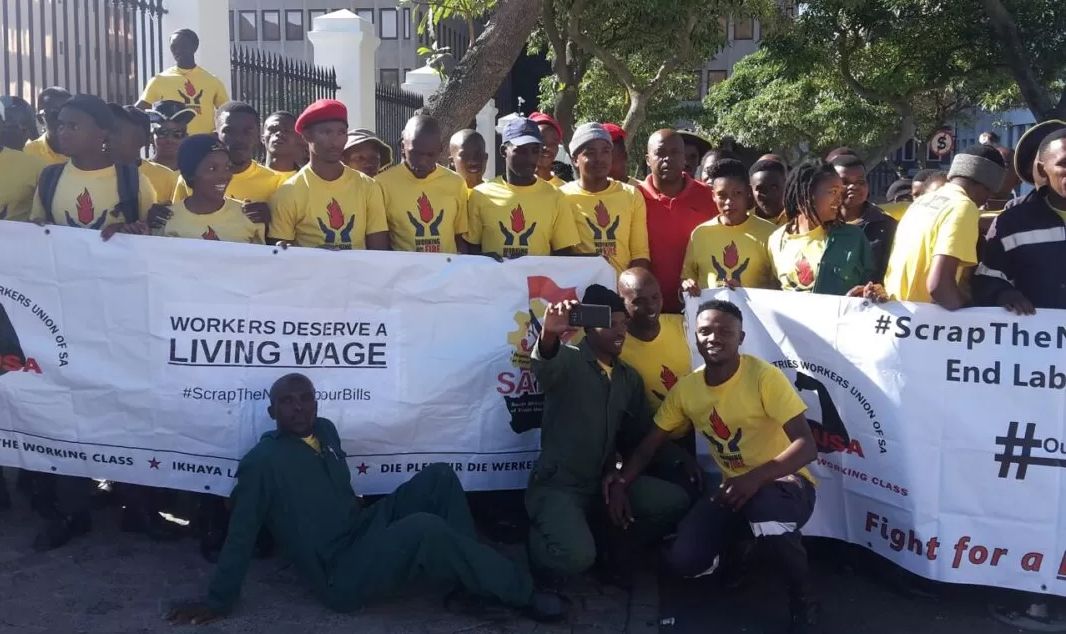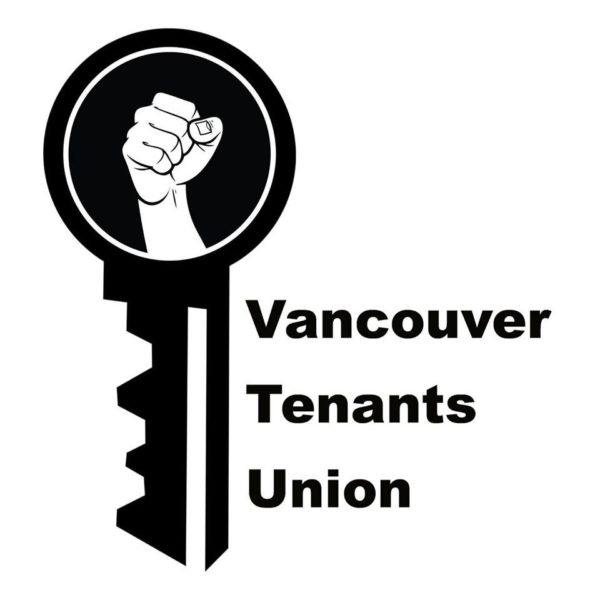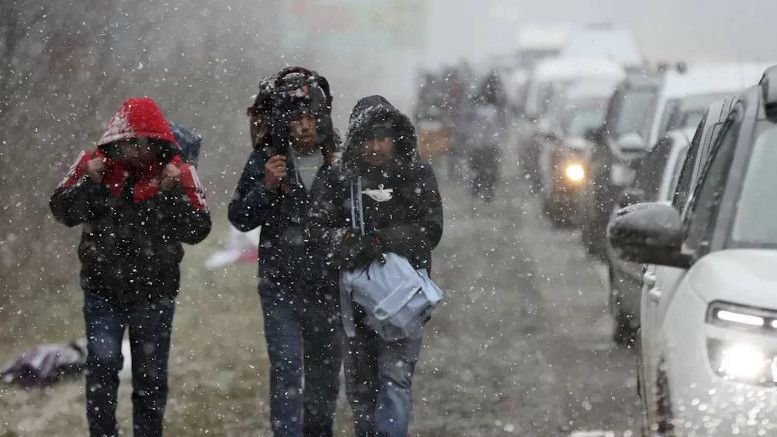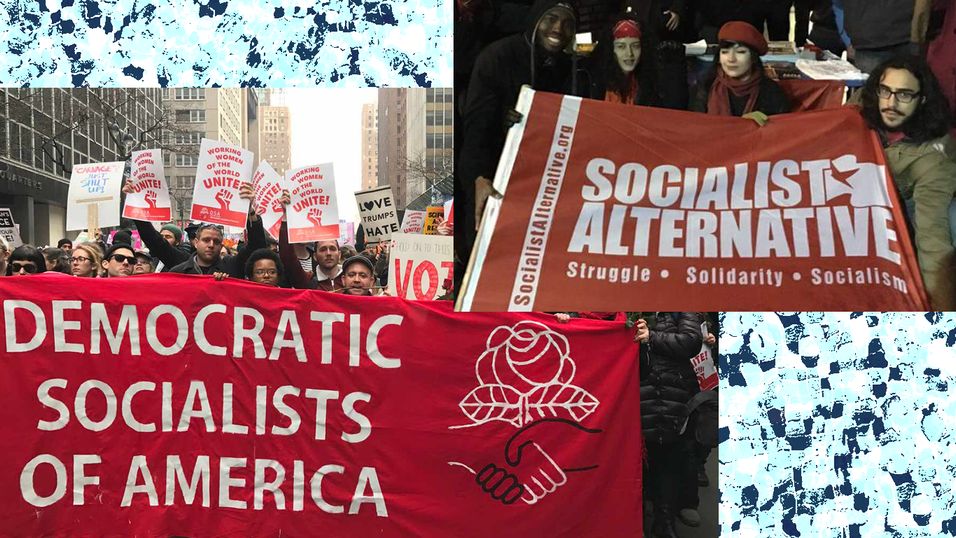Carmia Schoeman is a member of the Workers’ and Socialist Party (ISA in South Africa).
On the morning of Sunday 18 April, Cape Town residents watched in shock as what started as a small fire on Devil’s Peak quickly raged out of control. Within 24 hours, with the help of strong winds and dry brush, the fire has spread onto Table Mountain and threatens the City Bowl. The extent of damage and injury is unknown at this point, but it is clear that the University of Cape Town (UCT) suffered severe loss as several buildings, including its library and some student residences, were engulfed by flames. At least four firefighters are being treated for injuries sustained from their brave efforts. Currently areas surrounding Table Mountain are on high alert, with some being evacuated at time of writing.
The origin of the fire is not confirmed at this point, however veld fires as a naturally occurring phenomenon are often inevitable with fynbos species in this area even requiring fires for seed germination. The other certainty is the continuous budget cuts to the services that should maintain and manage our natural spaces, as well as to those that should keep us safe during natural disasters. Combined with the hot and dry conditions brought on by the escalating global climate crisis, this results in unnecessary destruction and even deaths that could easily be prevented if the wealth of society was owned collectively instead of privately and used according to need instead of gambled with for profit.
Housing for all a central issue
Fires are not uncommon in South Africa, but their consequences are largely preventable. In recent years several poor working class communities have been devastated by preventable fires, such as the one that destroyed 152 homes in the Khayelitsha informal settlement on the edge of Cape Town in January this year. Cramped living conditions, high population density, no access to basic needs like safe electricity connections and running water, and lack of decent affordable housing for the working class are all factors that determine the extent of the spread in household fires. When housing is simply not a priority for the government, fireproofing of housing is even less important. In its most recent budget proposal, the City of Cape Town (COCT), has allocated a disgraceful R17 Million to the burgeoning homelessness crisis. The total councillors’ remuneration on the other hand has been allocated more than ten times that amount (R189 Million). One of these councillors and mayoral committee member, JP Smith (cashing in a salary of over R1 Million according to 2019 data), has already alluded that the homeless are to blame for the fire before any investigation has been concluded. The DA continues to criminalise homelessness whilst pushing policies that exacerbate the crisis. Whether it is ultimately established that the fire was immediately caused by a homeless person is immaterial in our view. It is the government’s criminal neglect of the poorest of the poor in our society that forces the homeless into dangerous situations.
Neoliberal policies exacerbate climate crisis
Climate experts predict that Cape Town will get hotter and drier in the long term — the average temperature in this region has risen by almost 1 degree Celsius in only 50 years. The effects of climate change threaten the whole country and beyond. This reality means that investment in forest and fire prevention and management is crucial if we want to preserve lives, social infrastructure, and the natural environment. The Cape Town water crisis of 2017/18 showed that both the ANC national government and the DA local government are only interested in short term solutions with further privatised profit motives, like costly desalination plants, instead of updating aging infrastructure and investing in long term drought management and prevention. Moreover, the South African government continues to champion projects such as the coal-powered Greater Musina-Makhado SEZ. This will increase greenhouse emissions and promote corporate profits at the expense of society’s dire need to transition to a sustainable economy.
Private companies profit from public services
Currently, we must rely on the bravery of frontline workers risking their lives and health to hold back the local effects of the environmental crisis. Since 2018, WASP has supported fire fighters employed through the Expanded Public Works Program (EPWP) “Working on Fire” (WOF) who are currently fighting the inferno on the mountain. These fire fighters are specifically trained in veld fires, and this is used as a reason to outsource and pay them the pitiful EPWP wage of R11.42 per hour. The division between EPWP fire fighters and municipal fire fighters that handle infrastructure fires is completely superficial and a tool for the ruling class to divide workers that perform the same service to society.
The government claims that programmes like Working on Fire, which reportedly employs more than 5,000 fire fighters, alleviate poverty and improve living conditions for the program’s “beneficiaries” (a term used to avoid treating those in the program as workers who should enjoy full labour rights). Working on Fire receives around R700 Million in public funds, of which the Department of Environment Affairs (DEA) boasts “54% … are spent on wages with an additional 24% spent on indirect employee costs such as training, personal protective equipment (PPE) and transport.” This is contrary to the thorough report of a meeting of the Portfolio Committee on Environmental Affairs on 26 February 2019, where the chairperson Mapulane expressed concern that “only 36% [of the R678 Million in 2016/17 revenue] was expended on the poorest of the poor. The rest of the funds were paid to related parties [of Kishugu Holdings]”.The DEA report conveniently omits the fact that Kishugu, the holdings company of WOF, directly benefits from “indirect costs” through their network of subsidiaries that take on the transport and training services for WOF. Another glaring omission from the DEA is where the leftover 22% unaccounted for government funding goes. In 2018 the General Industries Workers Union of South Africa (GIWUSA) through which WASP has been organising WOF workers, reported that executives of the company were earning salaries of over R1.5 million per year as well as holding shares in the company. At the same time, fire fighters were earning only R23,000 a year for working 12-hour days, with no overtime pay if fire emergencies extended into the night time.
From these figures it is evident that the real beneficiaries of the outsourced public works program are the bosses of private companies like Kishugu. These “tenderpreneurs” line their pockets with public funds while lobbying their friends in government to continue the lawful extreme exploitation of workers. This is a key element of neoliberalism — privatisation of public services in the relentless pursuit of profit. In 2016 when these same fire fighters were deployed to Canada to assist in the wild fires, WOF was paid R1,900 per fire fighter per day. The company in turn paid the fire fighters as little as R220 a day for this high risk work on foreign soil. When WOF workers joined GIWUSA and struck in 2018 against their dehumanizing treatment and demanding a living wage, they were faced with disciplinary action by the management alongside union busting videos and voice notes on WhatsApp.
It is vital that workers revive this campaign in coordination with other WOF workers nationally, along with community healthcare workers and all other EPWP workers. The government contract for firefighting services is up for review at this very moment, which means the time is ripe to raise the demands for insourcing and a living wage of R12,500 through mass mobilizations and workplace actions.
Loss of public infrastructure and resources
The extent of damage to University of Cape Town is unclear at this point. However, the almost certain loss of irreplaceable archives at the UCT library, likely including its unique collections of African and Southern African studies, is evidently felt deeply by many. Political materials from the anti-apartheid struggle were housed in this library as well. These are all resources that help us analyse, understand and learn from history, various cultures, and society as a whole – and as Marxists we mourn this destruction of historic treasures. This also underlines the necessity of investing into the long-term preservation of such resources with haste. Mass digitization, for example, could have the added benefit of opening these invaluable resources to a wider audience usually excluded from universities. The long-term underfunding of universities, as a result of the ANC government’s broader neoliberal policies of underfunded public goods has been a factor slowing down such critical interventions.
Just one day before the Cape Town fire, the Charlotte Maxeke Academic Hospital in Johannesburg was forced to evacuate over 700 patients due to a fire. The circumstances surrounding the fire are still disputed, however the temporary closure of a crucial hospital during a public healthcare crisis and global pandemic will prove devastating as well.
Unless we prepare ourselves as the working class and demand sufficient funding of our educational institutions, the cost of rebuilding lost and damaged infrastructure will be passed onto us through increased fees, taxes on the working class, and further financial exclusions.
The root of the crises
As the Covid19 pandemic has brought to light – austerity budgets have left us with conditions prone to extreme crisis. We have the science, resources, and human capacity needed to mitigate, if not prevent, these crises. The effects of climate change, the continuing pandemic, the economic fallout, the jobs bloodbath are all burdens disproportionately suffered by the working class, and directly rooted in the workings of the capitalist system. While the bosses have multiple houses – and even bunkers – across the world to escape the consequences of this system, the working class does not have such luxuries. More than ever we need to unite as workers, students, youth, and communities to take on the crises facing humanity. The only way to do this is on a socialist program that fights for the complete transformation of society, to be democratically planned based on the needs of people in balance with our natural world.
We have to be absolutely clear – the working class should not inherit the mere ashes of a world destroyed by capitalist greed; we must fight as a class to seize the existing wealth in all its forms to be put to use for the good of all people and our planet.




